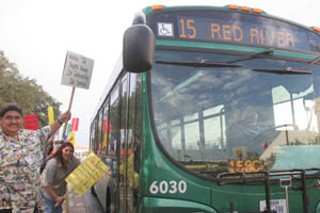Cap Metro Dodges Strike
Union, management credit Mayor Wynn
By Wells Dunbar, Fri., Feb. 3, 2006

No strike at Capital Metro.
A breakdown in negotiations Sunday evening made a strike by some 700 operators, mechanics, and other employees appear inevitable, but following a personal intervention by Mayor Will Wynn, Cap Metro contractor StarTran and the Amalgamated Transit Union Local 1091 reached an agreement in Monday's early morning hours. The contract, which heads to a union membership ratification vote tomorrow (Friday), ends nine months of heated disputes between the union, StarTran – Cap Metro's largest contractor – and the transit authority itself – for at least a year.
Cap Metro spokeswoman Andrea Lofye said the parties reached an agreement about 2am Monday morning. "We owe Mayor Wynn a great debt of gratitude," said Lofye, "for his involvement with both parties." Following an impasse at about 7pm, and an invitation from union president Jay Wyatt, "Wynn worked to bring both parties back to negotiations," Lofye said.
According to both union and management spokespeople, changes to employees' health care benefits were the biggest obstacle to a settlement. StarTran had proposed a $5 co-pay increase followed by another $5 bump the following year, unacceptable to the union – in the end, the two sides agreed on a $5 increase this year, no increase in the second year. Also, employee contributions to dependent health care premiums will rise 1% (to 11%) on the final day of the contract, thereby incorporated into the following contract. Lofye also said a new retiree health program provides retiring employees $5,000 per year in health reimbursements.
The two-year contract – retroactive to July 2005 – includes consecutive 3% annual raises. New drivers will now start at 60% of the top hourly wage, and take five years to reach top pay (just over $19/hour); the former contract began at 75%, with a four-year progression. Although that initial cut represented a significant union concession, StarTran's original proposal called for a two-tier system that would have prevented new hires from ever reaching the top wage rate of current employees. StarTran also agreed to reinstate an automatic union fee deduction (dues checkoff) from members' paychecks, which was interrupted in October. Management had initially insisted it would not resume dues collection unless employees rejoined the union.
"It's the best thing for the commuters that there's no interruption [of service]," Lofye said. Later, Wyatt agreed, telling reporters at a Monday afternoon press conference held at the local's headquarters, "When you strike, it hurts the community, your employees, and your employer." Wyatt blamed Capital Metro and StarTran for the protracted negotiations, and credited Mayor Wynn for ending the impasse. "The mayor talked to both parties," Wyatt said. "He pretty much served as a mediator." Wyatt noted wryly that "taxpayers paid almost half a million dollars [Wyatt's estimate of fees to StarTran's Houston attorney Jeff Londa] to not negotiate a contract," when the disagreement was ultimately settled by Wynn, shuttling between union representatives and management, including Cap Metro board chair Lee Walker.
"We've been in a long struggle, since April 19 [when negotiations began]," said Wyatt, adding that he was satisfied with the results of the settlement and would recommend passage by the membership. Of all the concessions 1091 made, he said, the lower wage scale for new employees troubled him the most. Asked if he anticipated greater difficulty organizing new members, Wyatt did predict "a little trouble in the beginning" but believes new employees will come to understand the union's position.
Later, Mayor Wynn told the Chronicle, "Although I've known from the beginning of my involvement in these negotiations that they would be difficult and that there would be a lot of brinkmanship involved, I never once doubted that if people stayed at the table and continued to negotiate in good faith there would be an outcome that met the needs of this community. ... If I did only one thing in this process, it was to make sure that we left no stone unturned in the final hours of these negotiations."
Although Wyatt said he considers the settlement a victory for the union, there were significant concessions on both sides. StarTran and Cap Metro won several cost-saving measures, and the union won raises and fought off the threat of a two-tier system, which it considered an attempt to destroy employee solidarity. The abbreviated nature of the contract, down from three to two years (until July 2007), however, means that the parties could resume negotiations on a new contract as early as next February.
It may take at least that long for hard feelings to subside. "Kill Rail" signs – which sparked a dispute when they appeared as bumper stickers on employee cars – remain posted on the walls of the union hall, trumpeting the union's argument that current employees are being squeezed to pay for Cap Metro's planned suburban commuter rail projects. Wyatt says it remains the union's position to oppose rail and that he believes the transit authority's resources would be better employed by improving the existing system. If that argument is not resolved, it may have even wider regional consequences than a bus strike.
Got something to say on the subject? Send a letter to the editor.








